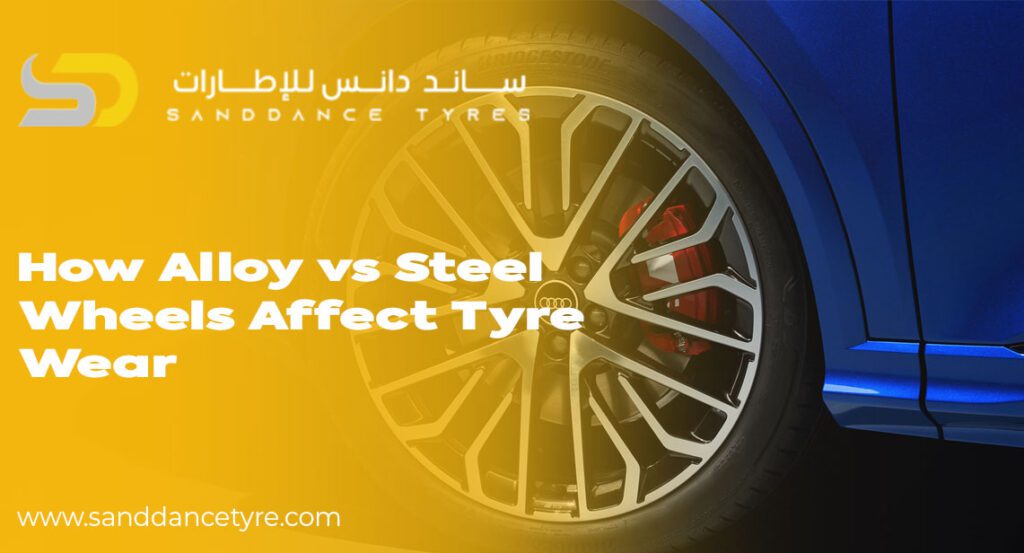When it comes to choosing wheels for your car, the decision between alloys and steel goes beyond what they look like. What you choose for your vehicle’s wheels will change its performance and handling, and also play a great role in tire wear. In the UAE, we see extreme temperatures and roads that range from smooth highways to rough terrain, which is why it is very important to know how wheel types play into tire life. This guide is to help UAE drivers out there understand the impact of wheel choice on tire wear and overall driving comfort.
Understanding the Difference Between Alloy and Steel Wheels
Alloys are made up of lightweight metals like aluminum and magnesium. They also have a very modern look, are lighter in weight, and perform better. As for steel wheels, which are made from pressed and welded steel, they are heavier but at the same time more durable and cost-effective. Each type of wheel has its pros and cons, but in terms of tire wear, it is a result of driving conditions, load, and heat management, which play a great role.
How Wheel Weight Affects Tyre Life
Wheel size is a factor in tyre wear, which over time becomes more noticeable. Steel wheels are heavy and add to the unsprung weight of the vehicle, which in turn causes tires to wear out faster especially on rough roads or during braking. Alloy wheels are lighter, which lessens the load on the suspension and tyres thus we see more even wear and better fuel economy. In the UAE which has mainly flat but very busy roads, lightweight wheels help tires perform better over long distances.
Heat Dissipation: A Key Factor in Tyre Longevity
In the UAE’s very hot summer climate, one of the key issues is heat buildup. As you drive at high speeds or break frequently, wheels and tires generate heat. Alloy wheels do a better job at dissipating that heat, which in turn helps to avoid tire overheating and tread separation. Steel wheels, because of their density, hold onto more heat, which in turn increases the risk of tire degradation. For UAE drivers who include those who commute on highways like Sheikh Zayed Road, alloy wheels provide better thermal management and safer performance.
Wheel Material, Tyre Effect on Suspension and Handling
The wheel material does play a role in how the suspension performs. With alloy wheels, which are of a lighter design, we see reduced strain on shocks and springs, which in turn provides for smoother handling and more uniform tire wear. Steel wheels, on the other hand, present a heavier option, which in turn does not handle impact as well; we notice this in poor road conditions like potholes or sudden braking. Also, we see that there is a difference in how tires break in shock and in maintaining their tread integrity, which is very noticeable on a mixed terrain.
Weight Impact on Fuel Consumption and Tyre Stress
In the heat of the UAE’s climate, steel wheels bring on greater stress, which in turn causes faster tread degradation. Also, the engine has to work harder to maintain speed, which in turn increases fuel consumption and puts more pressure on tires during acceleration. Alloys that are lighter in weight bear less stress, which in turn causes better and more uniform wear over time. Also, the issue of reduced rolling resistance plays a role in the improved tire performance.
Are Alloy Wheels Better for High-Performance Vehicles?
Yes. In most cases of high-performance and luxury cars, what you will see are alloy wheels, which improve speed, cornering, and tyre response. What we see is that in the sports and luxury car market, which is large in the UAE, this combination of alloy wheels with performance tires does better in terms of tread life and also in reducing sidewall damage.
Steel Wheels for Tough Terrain: Pros and Cons
While steel wheels may be heavier, they still perform better for off-road and commercial use because of their durability. In a construction site, dirt road, or rocky path, you will see steel wheels that stand up to a lot more damage without cracking. At the same time, though they do cause more tread wear due to their weight and poor heat dissipation. In the UAE, if you are an off-road driver but also value tire life, a balance between tough tires and lighter wheels may be the way to go.
Choosing the Right Wheel for Your Driving Style
Your wheel choice should be based on what you do behind the wheel. For city commutes and highway driving, we see benefit in alloy wheels’ performance that includes better comfort for you and your passengers, better tire health, and better fuel economy. For heavy-duty work or the occasional trip off-road, steel wheels will give you the durability you want, although at a trade-off of more rapid tire wear. At Sanddance Tyres, we assist our customers in pairing the best wheel for their individual needs, which can range from best life span, best performance, or best safety in bad weather.
Read More: Why You Need Tyre Rotation Every 8,000 km
Bottom Line
In the choice of alloy or steel you make, which is what type of wheel you put on your car, you see a direct play out in terms of tire wear, safety, and fuel economy. In the U.A.E.’s special environment of high heat and variable road types, alloy wheels tend to perform better, which in turn gives you better tire life and a more comfortable ride. Steel wheels do fair in terms of durability, but they put more stress on tires and will require more maintenance. At Sanddance Tyres, we are here to help U.A.E. drivers make informed decisions about which wheels and tires to put on their cars, so you get the best out of every drive.
Frequently Asked Questions
Do wheel alloys extend tire life?
Yes, alloy wheels have a lower weight and better heat dissipation, which in turn reduces tyre stress and promotes even wear out, in hot climates like that of the UAE.
Do steel wheels harden out tires?
Steel wheels also have a tendency to be heavier and to retain more heat, which in turn may cause greater tyre wear if not managed properly.
Which type of wheel does better for off-road use — steel or alloy?
Steel wheels do have better durability for off-road use, but they may cause your tyres to wear out faster. For smooth terrain and daily driving, alloy wheels are the way to go.
Do alloys offer better handling and ride comfort?
Sure, they reduce suspension load and see better tyre performance, which in turn provides for a smoother ride and better response in turns.
Can it be easily done from steel to alloy wheels?
Yes, switch over, but make sure the new wheels fit your car’s specific requirements — look at the bolt pattern, size, and offset that I have also noted down for you.

















